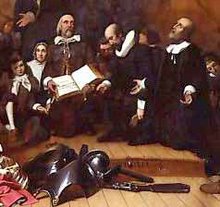The Westminster Confession of Faith Chapter V Of Providence
I. God the great Creator of all things does uphold,direct, dispose, and govern all creatures, actions, and things,from the greatest even to the least, by His most wise and holy providence, according to His infallible foreknowledge, and the free and immutable counsel of His own will, to the praise of the glory of His wisdom, power, justice, goodness, and mercy.
II. Although, in relation to the foreknowledge and decree of God, the first Cause, all things come to pass immutably, and infallibly; yet, by the same providence, He orders them to fall out, according to the nature of second causes, either necessarily, freely, or contingently.
III. God, in His ordinary providence, makes use of means, yet is free to work without, above, and against them, at His pleasure.
1.) How does God execute His decrees?
2.) What can we say to those who believe that after God created all things He then took a "hands off" approach?
3.) What are some of the dangers of adopting such ideas?
4.) There are some that would claim that God is the immediate cause of all things and that consciousness is a thorough delusion. How do we refute this lie?
5.) What are some of the dangers of adopting this theory?
6.)What would be a Biblical view of how God deals with His creation?
7.)There are four places that we can go to find proof of our view. They are nature, our works or skills, our nature and the Bible. Can you give some examples of how they prove it to be true?
8.) What does section 2&3 teach us?
9.) What are the different ways that God works out His providence?
10.) Is He limited to do it the same way all the time?
11.)Give some examples of second causes?
I was going to leave some answers but thought it better for you to think it out first. Thanks and good night.

No comments:
Post a Comment